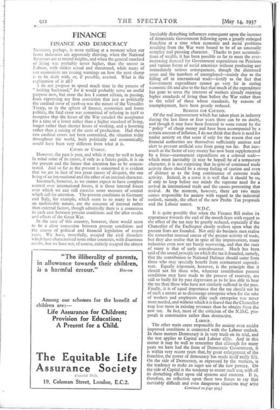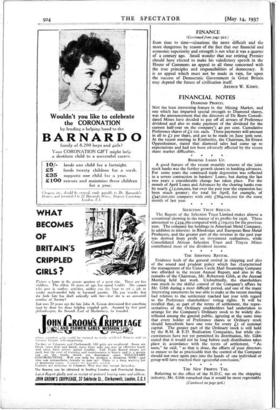FINANCE
FINANCE AND DEMOCRACY NOTHING, perhaps, is more striking at a moment when our home industries are apparently thriving, when the National Revenues are at record heights, and when the general standard of living was probably never higher, than the unrest in Labour, with strikes actual and threatened, while many of our economists are issuing warnings on how the next slump is to be dealt with, or, if possible, averted. What is the explanation of it all ? I do not propose to spend much time in the process of " looking backward," for it would probably serve no useful purpose now, but none the less I cannot refrain, in passing, from expressing my firm conviction that just as politically the cardinal error of 1918-19 was the nature of the Versailles Treaty, so in the sphere of finance, economics and home politics, the fatal error was committed of refusing in 1918 to recognise that the losses of the War entailed the acceptance for a time of a lower rather than a higher standard of living, longer rather than shorter hours of working, and a lowering rather than a raising of the costs of production. Had these two cardinal errors not been committed, the situation today throughout the world, both politically and economically, would have been very different from what it is.
CAUSES OF UNREST.
However, the past is past, and while it may be well to keep in mind some of its errors, if only as a future guide, it is on the present and the future that attention has to be concen- trated. And so far as the present is concerned it is evident that we are in face of two great causes of disquiet, the one being of an international and the other of an internal character.
Inasmuch, however, as we cannot expect to have complete control over international forces, it is those internal forces over which we can still exercise some measure of control which call for attention. The present conditions in Germany and Italy, for example, which seem to so many to be of an Undesirable nature, are the outcome of internal rather than external factors, though admittedly there is a connexion in each case between present conditions and the after results and effects of the Great War.
In the case of this country, however, there would seem to be a close connexion between present conditions and the course of political and financial legislation of recent years. We have, mercifully, escaped the civil disorders which have characterised some other countries, with disastrous results, but we have not, of course, entirely escaped the almost inevitably disturbing influences consequent upon the increase of democratic Government following upon a greatly enlarged franchise at a time when economic and social problems resulting from the War were bound to be of an unusually complex and pressing character. Thanks to past accumula- tions of wealth, it has been possible so far to meet the ever- increasing demand for Government expenditure on Pensions and various forms of social amenities without producing any immediately serious consequences, though the distressed areas and the numbers of unemployed—mainly due to the falling off in international trade—testify to the fact that Government expenditure cannot go very far in curing economic ills and also to the fact that much of the expenditure has gone to serve the interests of workers already enjoying higher standards of living than before the War rather than to the relief of those whose standards, by reasons of unemployment, have been greatly reduced.
REASONS FOR CAUTION.
Of the real improvement which has taken place in industry during the last three or four years there can be no doubt, and though it may have been fostered to some extent by the " policy " of cheap money and have been accompanied by a certain amount of inflation, I do not think that there is need for undue anxiety on that score if only for the reason that our financial authorities are themselves sufficiently anxious and alert to prevent artificial ease from going too far. But inas- much as the factor of easy money has now been supplemented by a force—rearmament expenditure on a colossal scale— which must inevitably (it may be hoped) be of a temporary character, it is not surprising that in spite of continued trade activity there should be a strong feeling of caution and even of distrust as to the long continuance of extreme trade activity. Indeed, in a sense it is well that it should be so, if only to keep before our minds the supreme need for a revival in international trade and the causes preventing that revival. At the moment, however, there are two main causes responsible for anxiety with regard to the industrial outlook, namely, the effect of the new Profits Tax proposals and the Labour unrest.
N.D.C.
It is quite possible that when the Finance Bill makes its appearance towards the end of the month fears with regard to the effect of the tax may be greatly reduced, especially if the Chancellor of the Exchequer clearly realises upon what the present fears are founded. Not only do business men realise the somewhat unusual causes of the greater activity of trade, but they also realise that in spite of the improvement, many industries even now are barely recovering, and that the state of many is that of early convalescence. Much has been said of the sound principle on which the tax is founded, namely, that the contribution to National Defence should come from those who may specially benefit from rearmament expendi- ture. Equally important, however, is the principle that it should not hit those who, whatever contribution present conditions may have made to the process of recovery, are still so badly hit by past depression as to be less able to bear the tax than those who have not similarly suffered in the past. Finally, it is of equal importance that the tax should not be of such a nature as to discourage enterprise when for the sake of workers and employers alike such enterprise was never more needed, and without which it is feared that the Chancellor may lose more in existing revenues than he obtains from the new tax. In fact, most of the criticism of the N.D.C. pro- posals is constructive rather than destructive.
LABOUR.
The other main cause responsible for anxiety even amidst improved conditions is connected with the Labour outlook. In these matters Democracy is in very truth on its trial, and the test applies to Capital and Labour alike. And in this matter it may be well to remember that although for many years we have had the form of Democratic Government, it is within very recent years that, by great enlargement of the franchise, the power of democracy has made itself really felt. On the side of Democracy, as expressed by the workers, is the tendency to make an eager use of the new powers. Ott the side of Capital is the tendency to resent such use, with all its disturbing effect upon old systems and customs. It is, therefore, no reflection upon these two forces to my that inevitably difficult and even dangerous situations may arise Continued on page 924.) FINANCE (Confirmed from page 922.) from time to time—situations the more difficult and the more dangerous by reason of the fact that our financial and economic superiority and strength is not what it was a quarter of a century ago. Small wonder that our retiring Premier should have elected to make his valedictory speech in the House of Commons an appeal to all those concerned with the true principles and responsibilities of democracy. It is an appeal which must not be made in vain, for upon the success of Democratic Government in Great Britain may depend the future of civilisation itself.
ARTHUR W. KIDDY.















































 Previous page
Previous page